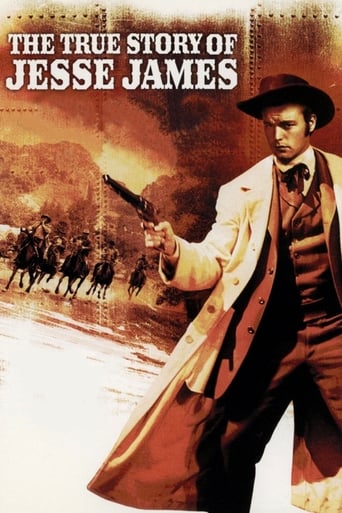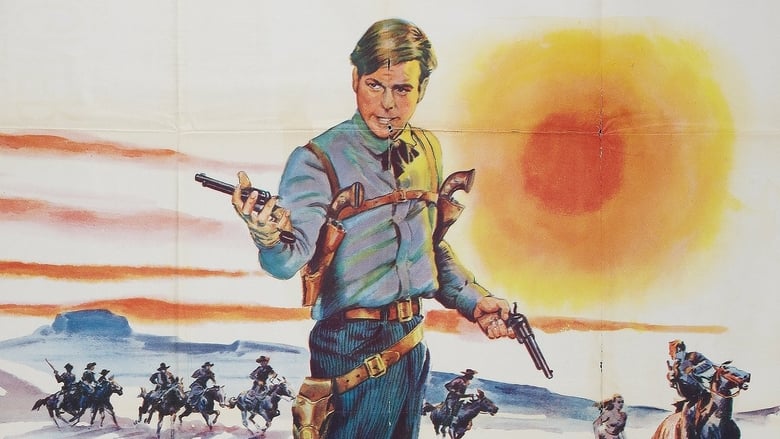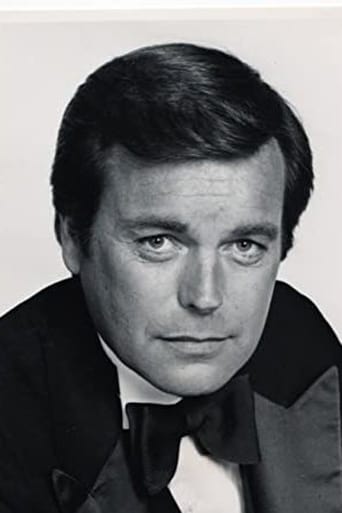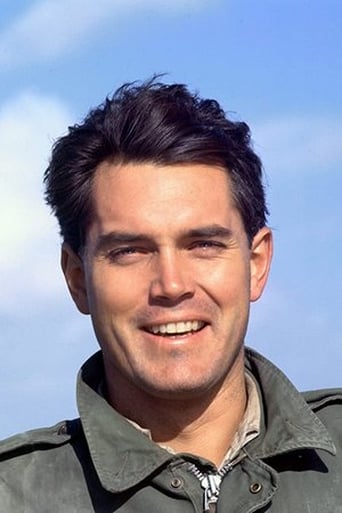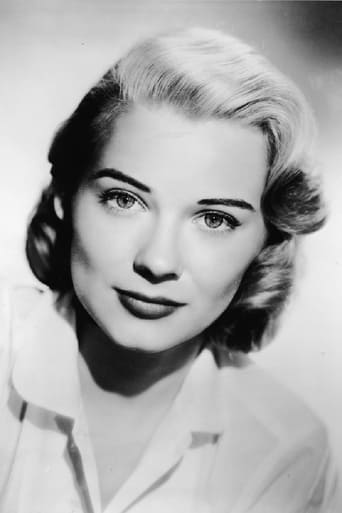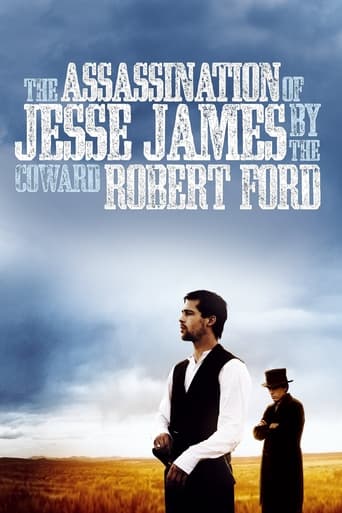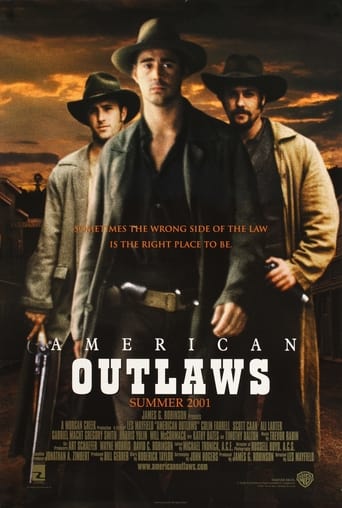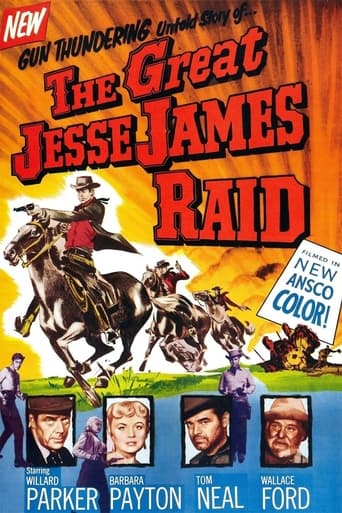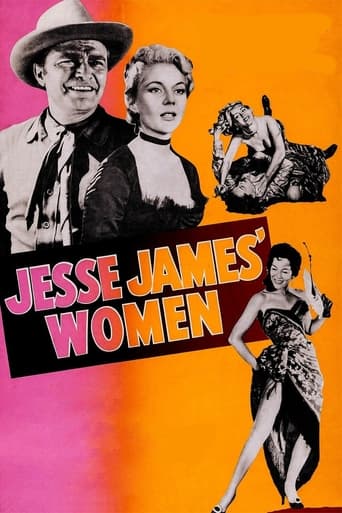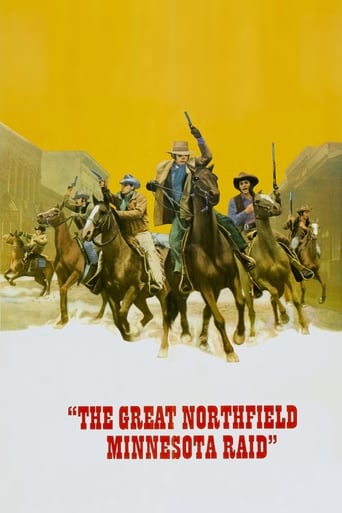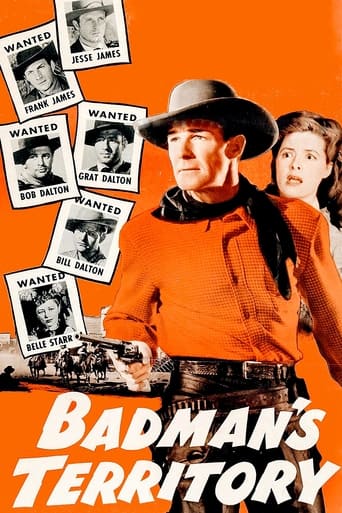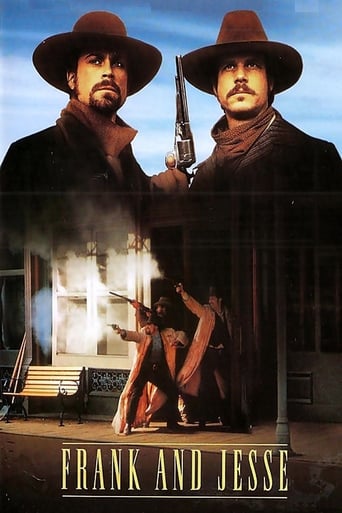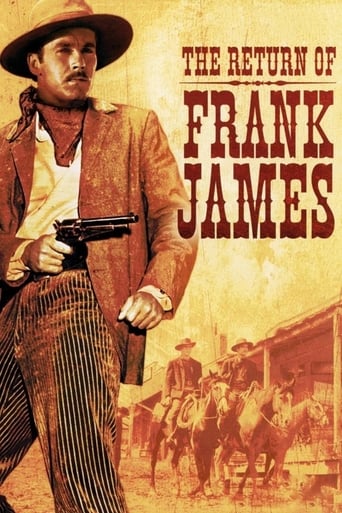The True Story of Jesse James (1957)
Having fought with the Confederacy during the Civil War, Jesse James and his brother Frank dream of a farm life in Missouri. Harassed by Union sympathizers, they assemble a gang of outlaws, robbing trains and becoming folk heroes in the process. Jesse marries his sweetheart, Zee, and maintains an aura of domesticity, but after a group of lawmen launch an attack on his mother's house, Jesse plans one more great raid -- on a Minnesota bank.
Watch Trailer
Cast
Similar titles
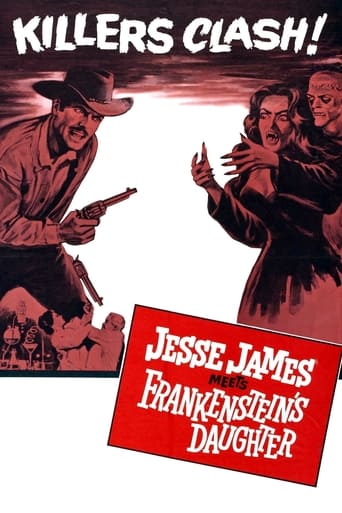
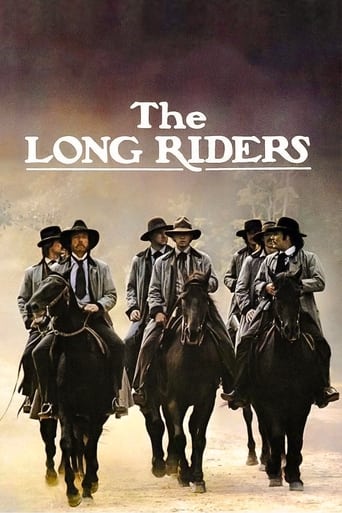
Reviews
It’s fine. It's literally the definition of a fine movie. You’ve seen it before, you know every beat and outcome before the characters even do. Only question is how much escapism you’re looking for.
Story: It's very simple but honestly that is fine.
Actress is magnificent and exudes a hypnotic screen presence in this affecting drama.
It is both painfully honest and laugh-out-loud funny at the same time.
OK-to-dull. Really doesn't add anything to the Jesse James story. Yes, I know it was released in 1957 but I doubt anyone in 1957 felt more informed about Jesse James by seeing this movie. Pretty much a paint-by-numbers docu-drama.Also feels like some details are left out. Ending seems abrupt - pacing is a bit off.Good action sequences, so goodish purely as a western.Robert Wagner is miscast as Jesse James. Far too straight-laced for the role. Hope Lange gives a fairly wooden performance. Supporting cast aren't too bad though.
Scenarist Walter Newman adapted Nunnally Johnson's screenplay from the 1939 Henry King western "Jesse James" with Tyrone Power and Henry Fonda for his script for "Johnny Guitar" director Nicholas Ray's quasi-remake "The True Story of Jesse James" with Robert Wagner and Jeffrey Hunter as Jesse and Frank James. Ray and Newman cover all the main narrative points that the King film handled, but "The True Story of Jesse James" lacks anything in the way charisma, suspense, or surprises. Wagner plays the legendary folk hero here with little of the luster than most movies about the James' Gang muster. Whereas Power and Fonda were sympathetic outlaws, Wagner and Hunter are far from likable. "The True Story of Jesse James" differs in many respects from "Jesse James." This film lacks the sentimentality of the King epic. Mind you, Twentieth Century Fox encores scenes from the original where Jesse and Frank plunge their horses off a cliff into a river to elude a posse as well as their escape from the botched Northfield robbery by riding through a store. The final scene when Jesse is shot in the back by Bob Ford is virtually identical to the Power version. The problem with this revisionist take of the notorious James gang is that is consists of several flashbacks. Ray and Newman open the western with the disastrous bank robbery in Northfield, Minnesota, and the James' gang's desperate bid to escape the authorities. While they are holed up in a cave waiting for nightfall to elude the search parties, Frank and Jesse recount their lives, going back as far as when Jesse was beaten up by Union troops in the Civil War. The Younger Brothers emerge as far more likable than the James' brothers, and Cole Younger (a portly, pipe smoking Alan Hale, Jr., of "Gilligan's Island") is as close as any character comes to serving as comic relief. The scene when the gang is eating lunch at the home of a widow woman who needs $600 to pay off her landlord is as close as this movie comes to having comic relief. Cole gives the old woman the sum of twenty dollars rather than the ten cents that she says he owes her. He adds that he is Cole Younger and wants to be remembered well. Jesse hears the part about the old woman needing the $600 and gives her the money to prove that he--Jesse James--does take from the rich and give to the poor. No sooner has the gang left the premises than the landlord shows up and takes the $600 from the widow. Since the gang hasn't left the premises, Jesse holds up the landlord and recovers the six-hundred dollars that he gave the old woman. The fire-eating publisher that Henry Hull played in the original appears but doesn't hog the comic relief. Once again, the title suggests the reason for this remake. Ray and Newman try to imbue the legend with authenticity. Wagner's Jesse is a cold-blooded, callous individual, and Wagner makes his performance a business only effort. Wearing a mustache, he displays nothing that would endear us to him.Ray and Newman don't follow the straight-forward, chronological narrative pattern of "Jesse James." They fracture the story line with the memories that the James boys have and they show the horrible conditions that prompted the protagonists to pursue the owl hoot trail. This time, however, Jesse is far more violent and willing to kill. The irony is that Jesse spends considerable time and detail orchestrating his elaborate plans, only to see them collapse like a flimsy deck of cards because of ill-fated luck and/or incompetence by his underlings. At one point, it appears almost certain that the James brothers are bound to receive amnesty after the Remington Detective Agency blows up their mother's house, depriving his mother, Mrs. Samuel (Agnes Moorehead of "Raintree County'), of an arm and her youngest son Archie of his life. Instead, Jesse guns down the man who helped the detectives; indeed, he pumps four bullets into the unarmed man. Jesse's treatment of his accomplices is pretty callous and he threatens at least one of them, Tucker (Clegg Hoyt of "The Brass Legend"), with death when he botches an important role in the Northfield robbery. Basically, aside from Joe MacDonald's elegant Cinemascope lensing of the action, "The True Story of Jesse James" qualifies as little more than a potboiler. The outlaws do look cool in this white dusters that they all wear when they ride into Northfield. The last scene reflects the feeling of the times. After Bob Ford shoots Jesse in the back and kills him, the neighbors pour into the premises to gawk at the corpse. Frank runs them out, but as some leave, they appropriate souvenirs from the James' possessions. Clearly, this film reflects some of director Nicholas Ray's concerns about youths in the 1950s as it is essentially about a "Rebel with a Cause." The production values are above-average.
It's easy to see what the people at Fox were thinking when they put this movie together. They put Robert Wagner, an actor they were very interested in promoting, in a movie with director Nicholas Ray, who'd created a cinematic miracle of sorts with James Dean in "Rebel Without a Cause" just a few years earlier. Perhaps they thought he could work magic with Wagner. They also put Jeffrey Hunter, another handsome young would-be star, in the film perhaps for insurance. And they had a story which was proved box-office, one of Tyrone Power's biggest commercial hits in Henry King's 1939 film. You can see how many scenes in this film evoke the memories of the audience from that film with the same images and iconography; if it wasn't for the odd qualities of the 1939 Technicolor process I would have suspected that a few scenes in this film were recycled from that one. But it's a more expensive type of film than that.Superficially, the story isn't more "true" than the 39 version. However, in this version the story is not told in a linear narrative. Rather, it begins with the James Gang's final holdup and tells much of the story through various flashbacks, then picks up the story again to show us its conclusion. Partly as a result of this, this version is less sympathetic to the James boys than the 1939 King version. In that one, it's kind of as if the film-makers were terrified of doing the slightest thing to make the audience dubious about Jesse James. This version doesn't exactly make him out to be a cold-blooded villain, but it doesn't really make him as much of a hero as the 39 either. Basically it shows that he was both. He perhaps started out with what he thought were good intentions. But he found that he enjoyed killing, and this particular film does make James out to be a bit of a sadist. He forgot what his purpose was in the first place. Ray managed to get good performances out of Hunter and Wagner for the scene in the cave where they confront each other. Notice how the other gang member is constantly shown up above listening to their conversation, but only interacts with Jesse after Frank leaves... a classic example of Nick Ray's use of triangulation.If Robert Wagner was just a bit more successfully emotive, this could be a better film. Still, he wasn't bad, and I thought Jeff Hunter managed just as well as Henry Fonda in the original film. The supporting cast is excellent, headed up by Hope Lange, Agnes Moorehead, plus tons of B movie/western regulars like Alan Hale Jr, Frank Gorshin, John Doucette, and for good measure John Carradine (who had played Bob Ford in the 1939 film).If someone *really* wants to buy into the whole "true story" aspect of this, then they're going to be disappointed. Likewise the people who are going to complain because maybe Wagner applies his pomade in a 50s style instead of an 1870s style. Whatever. I guess they're the same people who can't get past some of those strange or even surreal aspects of Nick Ray's greatest Western, "Johnny Guitar." Not to say this movie is anywhere near as good as that one, but it's no disgrace to Ray's reputation or any of the actors in the film either. It's a glossy entertainment package with some dark human reality buried just slightly beneath the surface -- hidden well enough so that anyone can see it, but only if they look. And like "Johnny Guitar", it shows us a West that still looks like Hollywood's West, but with Western "heroes" who aren't good or evil, but more than anything just plain tired. Looking for a place to hide out, to be "nice" as James says in Walter Newman's script. Perhaps "Jesse James" is more the movie Ray would have made for Republic if he focused on its world-weary male hero instead of becoming the bizarre (but unforgettable) diva-demolition derby that it became. John Carradine was in both of these movies as well... you just can't escape him when it comes to certain types of Western I guess, but who'd want to? The moment of James' death is indicative -- everyone has heard about it and everyone has seen it in other films, so instead of building up to it with music and drama like most versions, the stuff pretty much just happens really fast. And the letdown of that moment, that's something that's built into the whole movie. You can tell that Ray had seen Fuller's 1949 film about James, and this film feels like a strange hybrid between the King version and the Fuller version in a way. Not that he goes into the Bob Ford character or the aftermath in particular (he does use the same sort of image of a blind singer playing the "Coward Bob Ford" song), but it's like he's trying to allow the myth and the anti-myth to exist in the same film. The point isn't to keep us wondering whether Jesse James was a "good" guy or a "bad" guy, the point is to make that whole question pointless in and of itself. He was just a guy, he pretty much reacted to his circumstances not necessarily the way any other person would have, but the way that he would have, that his kind of man would. Largely gone is the 39 film's conceit that James would have liked to have simply settled down on a farm and been peaceful; Ray and Newman's James spits out the word "nice" to describe the life he imagines and dreams of as if he were a child trying to talk about sex, something in a totally different universe. He seduces Bob Ford with talk of the enjoyment of being in command, having power over others. His talk of a peaceful life is sincere, but unconvincing.
Every re-telling of the Jesse James story has been flawed. This picture has neither the carelessly cobbled script of "The Long Riders" nor the Robert Duvall version's annoying quirkiness and skewed morality. However, it is a highly selective narrative omitting much of the suffering caused by the Jameses and with several outright distortions of the historical record. For example, when he was shot by Robert Ford, Jesse James was in the process of assembling a new gang, not about to retire to the life of a farmer as depicted here.Robert Wagner is appropriately youthful in the title role. As brother Frank, the impossibly handsome Jeffrey Hunter has little to do but acts well. Agnes Moorehead plays Mrs. Samuel, the matriarch, as too saintly for my taste. But portraying a media-savvy Cole Younger, Alan Hale leads a particularly able supporting cast including, as an honorable Union soldier, the father of contemporary star Kurt Russell.The narrative is anchored to the disastrous expedition to Northfield, Minnesota. One nice touch, copied in a later retelling, was the inclusion of a Swedish-speaking actor to play one of the two town residents killed by the gang.
